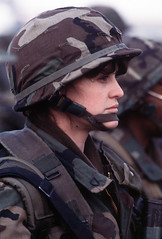 As we have shown in our trilogy of books, early home life is at the root of many of our cultural ills. Privation, neglect, and abuse in early life directly contribute to the levels of both crime and recidivism in later years.
As we have shown in our trilogy of books, early home life is at the root of many of our cultural ills. Privation, neglect, and abuse in early life directly contribute to the levels of both crime and recidivism in later years.
In downTown:USA we looked at the homeless problem and found a distressing number of mothers and families living on the streets. We also found a disproportionate number of veterans. Now, a few years later, the crossover between these two groups is growing.
Eric Tucker and Kristen M. Hall, of The Associated Press, covered this story recently and uncovered some extremely disturbing data:
Female veterans make up about 8 percent of all veterans, or about 1.8 million, compared to just 4 percent in 1990. The number of homeless female veterans has more than doubled from 1,380 to 3,328 between fiscal year 2006 and fiscal year 2010, according to a December U.S. Government Accountability Office report that found many with young children and nearly two-thirds between ages 40 and 59.
Male veterans encounter numerous obstacles when trying to reintegrate into normal life. Female veterans face all of these and many more as well. Tucker and Hall continue
Female service members, who in wars with increasingly blurred front lines return with post-traumatic stress disorder, face unique challenges, advocates say. Many have suffered sexual assault and remain too traumatized to share common space with men. Many are single mothers struggling to find housing for themselves and their children. They’re also more likely to be jobless: Unemployment for female veterans who’ve served since September 2001 was 12.4 percent last year, slightly higher than for their male counterparts.
Part of the problem is that the VA is a system built around male soldiers and their needs, not women. Some examples of this include:
- Current law doesn’t allow the VA to reimburse providers for housing children, creating a financial disincentive to do so. A recent GAO report notes that over 60% of existing grant and per diem programs serving homeless women that it surveyed didn’t house children.
- One hour south of a major military installation lies Nashville, TN. There are only seven transitional beds for homeless single women veterans in Nashville.
- The Department of Housing and Urban Development housing voucher program is a great resource that has helped house thousands of veterans and their families. It is limited, however, to those in the most extreme need. Usually this need is one that requires ongoing attention, such as substance abuse or mental health problems.
Many of these women are mothers, attempting to care for their children while living on the street. While it is tragic to see anyone homeless who has defended our country, it is doubly so to see this impact their children as well. I think we can all agree that this is not the way for an innocent child to grow up.









